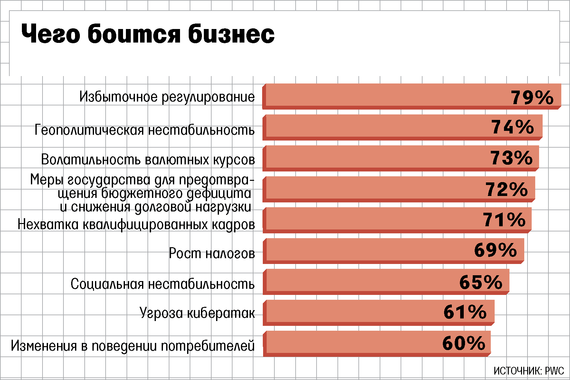Survey: what threatens the business and how to avoid it

Source: PWC / Vedomosti
PwC surveyed 1409 executives from large companies from 83 countries. Every day, big business runs the risk of losing large sums of money due to any “awkward traffic.” Researchers found out what the top officials of companies see such risks in. 30% of respondents run companies with revenues of more than $ 1 billion, 38% - more than $ 100 million.
Large firms operate around the world and face different cultures, traditions and laws. In recent years, developed countries have taken the path of unification of regulation, but countries such as China, South Korea, India, Brazil introduced their own rules - “in theory they resemble models of developed countries, but with national differences,” reasons Fisher & Paykel Healthcare Corporation Michael Danielle. For the second year in a row, the majority of respondents put the risk associated with excessive state regulation in the first place.
')
The top risk managers called geopolitical instability the next most important risk. So disturbing the situation has not been the past five years, the authors of the study indicate. Geopolitics is increasingly worried about business - 4 pp more than in 2015. Changes in the world “will occur with great speed - this is a new norm. By adapting to it, companies will be able to take a leading position, ”warns Cisco Chairman John Chambers of Cisco.
Closes the top three risks volatility in exchange rates. A year ago, the second and third places on the list of threats were taken by government measures for fiscal consolidation and an increase in the tax burden.
In order to adapt to the new rules of the game, the changing needs of customers and counter threats, companies must change their business models and use new technologies. However, only 61% of respondents expressed readiness for this. 77% of top managers agree that technological progress will be the main trend over the next five years.
Thanks to the development of technology, customers are becoming more self-sufficient, recognizes ING group leader Ralph Hamers: everyone knows, they can find everything on Google, and they come to the bank with completely different requests. Everything that is happening is part of a larger-scale change in the world order, Nikolai Kashcheev, director of the analytical department at Promsvyazbank, said earlier: this is a change in major cycles - technological, economic-financial and social, the most important technological changes launched the new economic paradigm.
Innovations and technologies can mitigate for companies the consequences of excessive government regulation and currency volatility, says Yevgeny Nadorshin, chief economist at Capital Capital. Companies with high productivity or innovative products can offset the additional costs due to product quality or pass them on to the consumer. But geopolitical risks are almost impossible to avoid, he warns.
For the second year in a row, the United States (39%) remain the most attractive market for top managers, Vedomosti reports, citing a study. Then China (34%) and Germany (19%) follow. The attractiveness of the Russian market declined after a slight increase in 2015 - on the same level with Mexico, Japan and the United Arab Emirates (5%). The BRICS countries are still investment attractive despite economic difficulties.
Source: https://habr.com/ru/post/298040/
All Articles